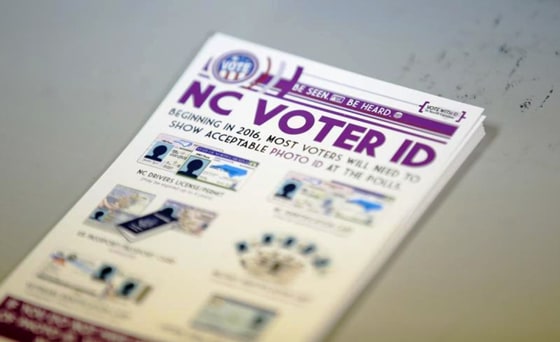Last month’s federal court ruling against North Carolina’s sweeping and restrictive voting law was hailed as a major victory for voting rights. But now the battle over voting in the Tarheel State is shifting to the local level — amid concerns that the court's decision could let county election officials impose new schemes to limit access to the polls.
Indeed, Francis De Luca, the head of a leading conservative think tank in the state, is publicly urging counties to do just that, saying making voting harder is just “partisan politics” — and that's fair game.
Jen Jones of Democracy North Carolina warned that could have serious consequences. “The prospect of having voters disenfranchised is still a clear and present danger here in this very new front in the war on voting rights,” she said.
The focus on local-level rules comes as North Carolina prepares to ask the U.S. Supreme Court to block the July 29 appeals court ruling against the law, allowing the measure to stay in place for the election. The ruling by a panel of the 4th U.S. Circuit Court of Appeals reversed several provisions of North Carolina’s 2013 voting law, including the law’s cutting of early voting days from 17 to 10, the elimination of same-day voter registration, and a voter ID requirement. The court found that Republican lawmakers had targeted black voters “with surgical precision.”
Related: Appeals Court Rejects Strict North Carolina Voting Law
Most observers think it's unlikely that the high court will intervene. But there are also fears that confusion over the state of the law, which has been fought over in court for nearly three years, could keep some voters away.
The stakes are high: North Carolina figures to be one of the closest states in the presidential race, as it was in 2008 and 2012. And Gov. Pat McCrory, a Republican, is in a tight re-election race.
“Remember it’s partisan politics, it’s not racial or anything.”
One result of the decision is that counties must now draw up new early voting plans providing 17 days of early voting. That has voting rights advocates worried that some counties could take the opportunity to cut early voting sites and reduce hours, even as they add the additional seven days — with the potential result that access for some voters could end up being not much better than it would have been under the GOP law.
The state’s local election boards are all controlled by Republicans. By state law, local election boards comprise three members: one Democrat, one Republican, and one member of the governor’s party.
Adding to the concern is that the Republican-backed voting law also banned straight-ticket voting — a time-saving device that lets voters press one button to vote for all of one party’s candidates, and one that was used by 56 percent of North Carolina voters in 2012. That provision of the law wasn’t challenged or repealed. Without straight-ticket voting, voters will take more time in the booth, potentially leading to longer lines, especially if counties offer fewer early voting sites. And that comes at a time when voting rates in the state are increasing.
Related: Analysis: Trump Not the First to Claim Voter Fraud Will Rig Elections
“You’ve got more voters, more precincts that are loaded up, it takes more time to vote,” said Bob Hall of Democracy North Carolina. “Meanwhile if you cut back on early voting sites and hours, it’s a formula for disaster.”
De Luca, the president of the conservative Civitas Institute, last week encouraged counties to draw up plans that limit access to early voting. In comments to a friendly reporter, De Luca suggested that Mecklenburg County, the state’s largest, could comply with the law by opening just one early voting site for 17 days.
“I would recommend that every county board of elections look at their one-stop voting sites and revisit that immediately and make sure that what they do fits their counties,” De Luca said. “They can save money, they can better serve their public, and the court has given them carte blanche to do what they want with one-stop voting.”
De Luca accused county boards of expanding access in order to help Barack Obama in 2008, when the boards were controlled by Democrats. “So all now the 100 Republican-controlled county boards of elections can be just as political with it,” De Luca said. “Remember it’s partisan politics, it’s not racial or anything.”
The Civitas Institute is funded in large part by the family foundation of Art Pope, the discount chain-store multi-millionaire who was the prime funder of the successful Republican bid to win control of the state legislature in 2010, and who then served as McCrory's top budget adviser.
Related: Texas Voter ID Ruling Offers Stinging Rebuke to Law's Backers
Voters in Guilford County, North Carolina, dodged a bullet Monday. Voting rights advocates had feared that the local board would reduce the number of early voting sites from 22 to 12, shuttering sites at two Greensboro universities, one of which would be the historically black North Carolina A&T State University. But after activists and concerned citizens flooded the election board meeting Monday afternoon, commissioners voted instead, unanimously, to create 25 early voting sites, to maintain Saturday and Sunday voting days, and to keep the two university sites in place.
But Wake County, the second largest in the state, was set to host its own meeting by phone early Monday evening. Republicans there are said to have been floating a plan that would involve only one early-voting site for the first seven days of the 17-day period.
Voting rights advocates also are closely watching other counties with large urban populations, including Mecklenburg (Charlotte,) Forsyth (Winston-Salem), New Hannover (Wilmington), and Wattauga (Boone).
